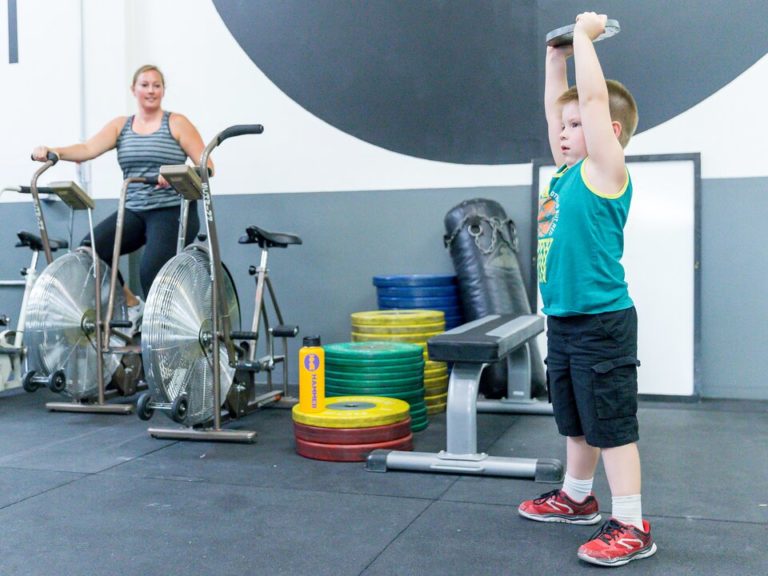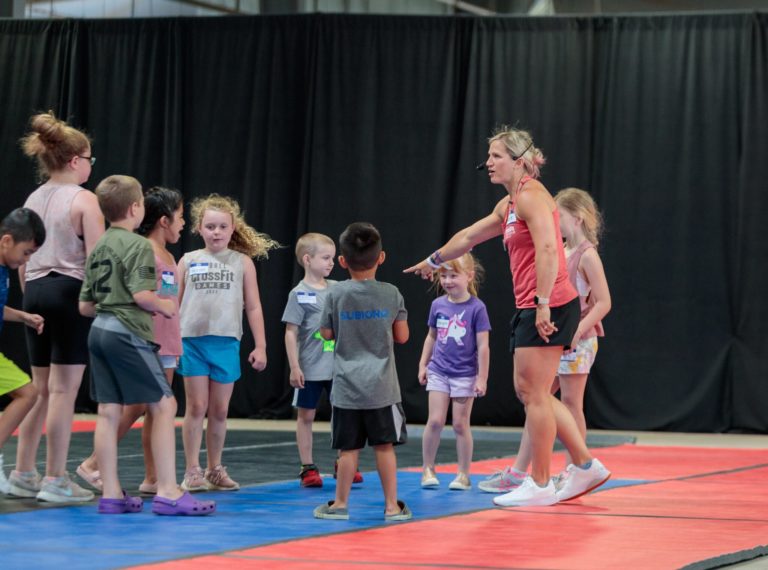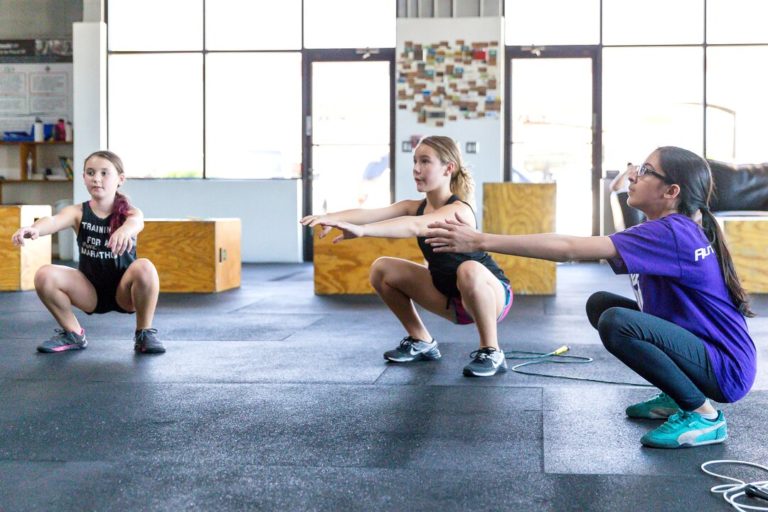Just as CrossFit benefits adults of all ages, the same can be said for kids — training for kids versus adults varies by degree, not kind. There are countless CrossFit Kids programs held in thousands of affiliates and over 400 schools all over the world serving youth athletes — some who are training for another sport and some who consider CrossFit their primary sport or outlet for movement. Whatever the goal, the program offers kids a head start on a healthy lifestyle encouraging a love for fitness and an understanding of the impact of nutrition.
CrossFit Kids was created in late 2003. The prescription for youths doing CrossFit is the same as for adults: constantly varied functional movements executed at high intensity (relative to the individual). The difference is the time one takes before entering high intensity. For adults, the process can be a couple of weeks to a month or more before we start to do more reps or start to push a little harder. For children, we have five to seven years before we need to think about pressing the intensity. The Kids program is informed by research in the fields of exercise science, behavioral science, molecular biology, and others, always ensuring the methodology evolves as we learn more about kids and fitness.
 The program combats some of the largest health problems facing our youth today including childhood obesity and Type 2 diabetes. As a result of the agricultural and industrial revolutions, humans today move less and eat more highly processed foods with loads of added sugar. History shows that our children are likely to adopt habits they saw growing up, so if a lack of movement and poor nutrition is the lifestyle of their elders, children are statistically more likely to live a similar unhealthy lifestyle into adulthood. One of the goals of CrossFit Kids is to break the cycle of passing on poor behaviors by instilling in this and future generations of children a positive association with exercise, a desire to be fit, and a goal to live a long, healthy life.
The program combats some of the largest health problems facing our youth today including childhood obesity and Type 2 diabetes. As a result of the agricultural and industrial revolutions, humans today move less and eat more highly processed foods with loads of added sugar. History shows that our children are likely to adopt habits they saw growing up, so if a lack of movement and poor nutrition is the lifestyle of their elders, children are statistically more likely to live a similar unhealthy lifestyle into adulthood. One of the goals of CrossFit Kids is to break the cycle of passing on poor behaviors by instilling in this and future generations of children a positive association with exercise, a desire to be fit, and a goal to live a long, healthy life.
CrossFit Kids teaches foundational movement patterns, providing children with a portion of their prescribed amount of exercise for the week, improving muscular fitness, engineering endless opportunities for success, and discussing roles for food while keeping the class and its information fun and engaging. As an infinitely scalable program, CrossFit Kids can also bring the benefits of physical activity to disadvantaged populations.
CrossFit Kids classes always have an aspect of unpredictability; they are constantly varied. There is a consistent structure to the class, but what happens within each of the components of the class is what changes. Classes are built on a foundation of age-appropriate short segments that allow goals to be accomplished within them and are not too long to lead to boredom.
The methods used to teach movement within this program are broad, general, and inclusive — meaning anyone can learn, from the youth athlete to the kid who’s never been exposed to exercise. CrossFit Kids participants will learn movement patterns for the squat, deadlift, press, and more, through age-appropriate progressions and games with their own body weight or equipment that is easily managed by the age group.
Who is CrossFit Kids For?
CrossFit Kids is for kids ages 3-18. The program breaks age groups into four categories: preschool (ages 3-5), kids (5-12), preteens (10-12), and teens (12-18). Programming for each group is tailored to and delivered in an age-appropriate manner that serves to achieve different goals.
Preschool
Participating in CrossFit Kids preschool classes is exciting for young children. It may be that this is a child’s first exposure to CrossFit, or they may have been watching their parents or older siblings partake in classes. Now, they have a class of their very own. This age group performs all movements unloaded, which means nothing in their hands — a PVC pipe is added weight to a 3-year-old. These classes generally include a fun warm-up, a short workout, and a game.
The focus is heavily on having fun and learning about moving their bodies. These classes include equipment like gymnastics mats, rings, and cones.
Kids
Once a child moves into the kids group, they will use all the equipment from the preschool class plus adjustable pull-up bars, medicine balls, and light weights such as kettlebells and dumbbells. Kids classes include a warm-up, a short workout, and a game.
Preteens
As a child matures, they may start to find challenges and hard work just as fun as playing games. When this happens, a preteens class is a great way to blend the structure of a teen class with the fun of a kids class.
Preteen classes will have a slightly longer warm-up, followed by a workout, and will still end with a game. They will add PVC pipes and light barbells to class, and more structure to ensure they can move properly with appropriate light loads
Teens
Teen classes utilize a lot of the same equipment as adult classes. This class is preparing teens to eventually enter the adult classes and the motivations change drastically; teens are motivated by adding weight, decreasing finish times, competing against peers, and setting new PRs.
Teen classes will have a longer specific warm-up and workout, typically followed by skill work, which mirrors the structure of an adult class.
What Are the Benefits of CrossFit Kids?
Physically, CrossFit Kids works to battle childhood obesity and rising rates of Type 2 diabetes in kids. According to the World Health Organization, 39 million children around the world are overweight or obese. Lifestyle is the root cause of these problems. If a child is active and avoids eating and drinking processed carbohydrates, these maladies are virtually impossible to contract.
With the rise of technology, kids are spending more time being sedentary on their devices rather than moving their bodies throughout the day. With the increase in consumption of highly processed foods and added sugars, the number of kids suffering from health issues is rising. The CrossFit Kids program adds functional movements delivered in fun classes into a kid’s life to get them moving their bodies and enjoying exercise. By getting our kids to move their bodies, eat right, and enjoy both, they will be unlikely to lead an unhealthy lifestyle that ends up with these problems. If they are already afflicted with these problems, they have the opportunity to stop their progression and most likely reverse it.
Oftentimes, kids who partake in CrossFit find that it helps them perform better in their chosen sport as well. Since CrossFit elicits a broad and well-rounded level of fitness, the benefits easily carry over into other sports and can be a great compliment to sport-specific training.
In addition to the physical, there are countless cognitive benefits of training with CrossFit Kids. A significant amount of education occurs within the various CrossFit Kids classes, which means while kids are exercising their bodies, they’re also exercising their brains. As they learn, new connections are formed in the brain leading to improved attention, mood, and self-confidence.
How Do I Start a CrossFit Kids Program?
The first step to starting a CrossFit Kids program in your affiliate or offering your services to another affiliate is to complete the CrossFit Level 1 Certificate Course, which provides an introductory education on the fundamental principles and movements of CrossFit. The Level 1 offers expert instruction on CrossFit methodology through two days of classroom instruction, small-group training sessions, and coach-led workouts. The Level 1 environment and all aspects of the course are supportive of all levels of athletes, from the absolute beginner to the more experienced. Instruction includes lectures on foundational movements, the CrossFit methodology, nutrition, and programming.
 Once you have earned your Level 1 Certificate, it is recommended, although not required, that you sign up for the CrossFit Kids Certificate Course. The two-day live and interactive Kids webinar provides safe, effective, and age-appropriate methods for teaching CrossFit to children and adolescents, ages 3-17. The course also covers how to build a CrossFit Kids program at a school or CrossFit affiliate. Throughout the course, participants learn how to pair fitness with fun, which is essential to setting a child on the path toward a lifetime of fitness. Affiliate owners, teachers, coaches, and parents all benefit from learning this unique, kid-friendly approach to teaching CrossFit.
Once you have earned your Level 1 Certificate, it is recommended, although not required, that you sign up for the CrossFit Kids Certificate Course. The two-day live and interactive Kids webinar provides safe, effective, and age-appropriate methods for teaching CrossFit to children and adolescents, ages 3-17. The course also covers how to build a CrossFit Kids program at a school or CrossFit affiliate. Throughout the course, participants learn how to pair fitness with fun, which is essential to setting a child on the path toward a lifetime of fitness. Affiliate owners, teachers, coaches, and parents all benefit from learning this unique, kid-friendly approach to teaching CrossFit.
Once you’re ready to think about starting a Kids program, CrossFit has various resources that can inform how you get started such as the CrossFit Kids Startup Curriculum and the CrossFit Kids Training Guide.
What Are the Risks of Kids Doing CrossFit?
As with all things in life, CrossFit Kids is not without risk. Mitigating risk in CrossFit Kids classes will come from the coaches’ careful attention to detail, adherence to CrossFit’s principles when coaching kids, as well as open and effective communication between parents and coaches.
Accidental injuries such as dropping a weight on your toe or pinching your fingers when putting away a dumbbell are much more common than any injuries related to the movements performed in class. Having a qualified coach to guide young athletes in CrossFit Kids classes will ensure they are performing movements safely and that their intensity is relative to their capacity.
 One risk to address is the possibility of growth-plate injuries. Growth plates make up the area of tissue near the ends of bones in children and teens that determine the future length and shape of mature bones. They are particularly vulnerable to injury as they are the last portion of the bone to harden. In general, growth plates can be injured from resistance training; however, the vast majority of injuries to growth plates occur from sports like football, soccer, lacrosse, field hockey, volleyball, and rugby. These involve dramatic changes of momentum; activities where adults may get tendon or ligament injuries — for kids the bone is weaker. For these reasons, all lifts are practiced with no load or light loads until mechanics and consistency are observed — this may take years for younger children and inside of a week or month for older and/or more accomplished athletes.
One risk to address is the possibility of growth-plate injuries. Growth plates make up the area of tissue near the ends of bones in children and teens that determine the future length and shape of mature bones. They are particularly vulnerable to injury as they are the last portion of the bone to harden. In general, growth plates can be injured from resistance training; however, the vast majority of injuries to growth plates occur from sports like football, soccer, lacrosse, field hockey, volleyball, and rugby. These involve dramatic changes of momentum; activities where adults may get tendon or ligament injuries — for kids the bone is weaker. For these reasons, all lifts are practiced with no load or light loads until mechanics and consistency are observed — this may take years for younger children and inside of a week or month for older and/or more accomplished athletes.
CrossFit Kids has the power to positively change children’s lives from a very young age. If you are interested in enrolling your kids in a CrossFit Kids class near you, check out the Affiliate Finder Map and contact a local gym in your area to inquire about a kids program.
What is CrossFit Kids?
4